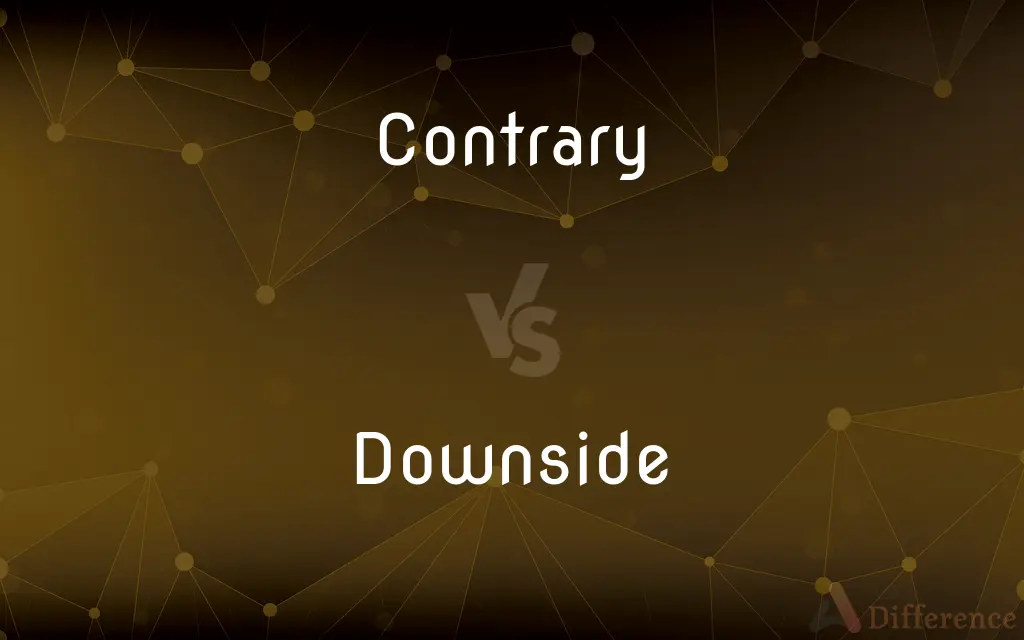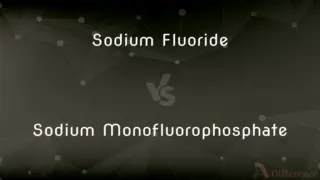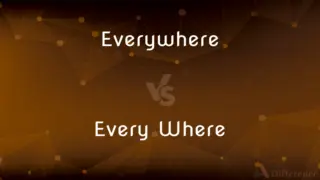Contrary vs. Downside — What's the Difference?
By Tayyaba Rehman — Published on November 23, 2023
"Contrary" means opposite in nature or direction. "Downside" refers to the negative aspect or disadvantage of something. Both relate to negatives but in distinct contexts.

Difference Between Contrary and Downside
Table of Contents
ADVERTISEMENT
Key Differences
"Contrary" often alludes to something being the opposite of a given fact or a common belief. It can describe things, attitudes, or situations that are diametrically different. On the other hand, "Downside" speaks to the negative aspects or the disadvantages associated with a particular thing or situation.
While "Contrary" implies a stark difference or opposition, "Downside" focuses on the less favorable part of a situation or item. For example, the contrary of a widely held belief might be an unpopular opinion, while the downside of a beneficial situation could be its unintended negative consequences.
In usage, "Contrary" often appears when emphasizing the reversal or opposite nature of something. It could be used in sentences like "Contrary to popular belief, cats are not aloof creatures." Meanwhile, "Downside" is commonly used when weighing the pros and cons, such as "The downside to this investment is its high risk."
The nuances between "Contrary" and "Downside" are vital. While the former highlights a stark contrast, the latter pinpoints the negative facet of a broader picture. It's essential to understand this distinction to utilize these words effectively in communication.
Both words, "Contrary" and "Downside," enrich our language by providing ways to discuss opposition and disadvantages. Still, they serve distinct purposes and should be chosen carefully based on the intended meaning.
ADVERTISEMENT
Comparison Chart
Nature
Indicates opposition
Indicates a negative aspect
Usage
Emphasizes reversal or opposite
Highlights a disadvantage
Context
Often used against a known fact or belief
Used when weighing pros and cons
Grammatical Role
Can be a noun, adjective, or adverb
Typically used as a noun
Associated Emphasis
Contrast or opposition
Negative facet of a situation or item
Compare with Definitions
Contrary
Opposite in nature, direction, or meaning.
Her actions were contrary to her words.
Downside
The negative aspect or disadvantage of something.
The downside of the deal was the high cost.
Contrary
Contradictory in character.
His calm demeanor is contrary to his aggressive gameplay.
Downside
A disadvantageous aspect of a situation or product.
Every investment has its potential downside.
Contrary
Opposed, as in character or purpose
Contrary opinions.
Acts that are contrary to our code of ethics.
Downside
The part of a situation that is considered less favorable.
The only downside to the trip was the weather.
Contrary
Opposite in direction or position
Our boat took a course contrary to theirs.
Downside
The potential negative outcomes.
She didn't see any downside to her decision.
Contrary
(Music) Moving in the opposite direction at a fixed interval
Playing scales in contrary motion.
Downside
The unfavorable part or side.
The downside to his promotion was the added stress.
Contrary
Adverse; unfavorable
A contrary wind.
Downside
The lower side or portion.
Contrary
(also kən-trârē) Given to recalcitrant behavior; willful or perverse.
Downside
A disadvantageous aspect
An option with a downside as well as benefits.
Contrary
Something that is opposite or contrary.
Downside
A downward tendency, as in the price of a stock.
Contrary
Either of two opposing or contrary things
"Truth is perhaps ... a dynamic compound of opposites, savage contraries for a moment conjoined" (A. Bartlett Giamatti).
Downside
A disadvantageous aspect of something that is normally advantageous.
The downside of obtaining a higher rank is that far more work is expected.
Contrary
(Logic) A proposition related to another in such a way that if the latter is true, the former must be false, but if the latter is false, the former is not necessarily true.
Downside
A downward tendency, especially in the price of shares etc.
Contrary
In an opposite direction or manner; counter
The judge ruled contrary to all precedent in the case.
Downside
The side of something that is at the bottom, or that is intended to face downward.
Contrary
Opposite; in an opposite direction; in opposition; adverse.
Contrary winds
Downside
A negative aspect of something that is generally positive;
There is a downside even to motherhood
Contrary
Opposed; contradictory; inconsistent.
Contrary
Given to opposition; perverse; wayward.
A contrary disposition; a contrary child
Contrary
Contrarily
Contrary
The opposite.
Contrary
(logic) One of a pair of propositions that cannot both be simultaneously true, though they may both be false.
Contrary
(obsolete) To oppose; to frustrate.
Contrary
(obsolete) To impugn.
Contrary
(obsolete) To contradict (someone or something).
Contrary
(obsolete) To do the opposite of (someone or something).
Contrary
(obsolete) To act inconsistently or perversely; to act in opposition to.
Contrary
(obsolete) To argue; to debate; to uphold an opposite opinion.
Contrary
(obsolete) To be self-contradictory; to become reversed.
Contrary
Opposite; in an opposite direction; in opposition; adverse; as, contrary winds.
And if ye walk contrary unto me, and will not hearken unto me.
We have lost our labor; they are gone a contrary way.
Contrary
Opposed; contradictory; repugnant; inconsistent.
Fame, if not double-faced, is double mouthed,And with contrary blast proclaims most deeds.
The doctrine of the earth's motion appeared to be contrary to the sacred Scripture.
Contrary
Given to opposition; perverse; forward; wayward; as, a contrary disposition; a contrary child.
Contrary
Affirming the opposite; so opposed as to destroy each other; as, contrary propositions.
Contrary
A thing that is of contrary or opposite qualities.
No contraries hold more antipathyThan I and such a knave.
Contrary
An opponent; an enemy.
Contrary
See Contraries.
Contrary
To contradict or oppose; to thwart.
I was advised not to contrary the king.
Contrary
A relation of direct opposition;
We thought Sue was older than Bill but just the reverse was true
Contrary
Exact opposition;
Public opinion to the contrary he is not guilty
Contrary
Two propositions are contraries if both cannot be true but both can be false
Contrary
Very opposed in nature or character or purpose;
Acts contrary to our code of ethics
The facts point to a contrary conclusion
Contrary
Of words or propositions so related that both cannot be true but both may be false;
`hot' and `cold' are contrary terms
Contrary
Resistant to guidance or discipline;
Mary Mary quite contrary
An obstinate child with a violent temper
A perverse mood
Wayward behavior
Contrary
In an opposing direction;
Adverse currents
A contrary wind
Contrary
In opposition to what is expected.
Contrary to expectations, the event was a success.
Contrary
Being so different as to be at odds.
The contrary opinion was not well received.
Contrary
A fact or condition incompatible with another.
Ice cream and hot sauce are often seen as contraries.
Common Curiosities
Can "Contrary" be used as an adjective?
Yes, "Contrary" can describe something as being opposite or different.
Is "Downside" only about disadvantages?
Primarily, yes. It focuses on the less favorable aspects or consequences.
How is "Downside" typically used?
"Downside" refers to the negative aspect or disadvantage of something.
Are there upsides to a downside?
Figuratively, yes. Recognizing a downside can lead to better decision-making.
Do "Contrary" and "Downside" have the same roots?
No. "Contrary" derives from Latin "contrarius," while "Downside" is an English compound word.
How might one use "Contrary" in a sentence?
For example: "Contrary to initial reports, the event was a massive success."
Is "Contrary" always negative?
No, it denotes opposition, which can be either positive or negative based on context.
What does "Contrary" mean?
"Contrary" means opposite in nature, direction, or meaning.
Is "Downside" always a noun?
Typically, yes. It refers to the negative aspect of something.
Can "Contrary" and "Downside" be used interchangeably?
No, they serve different purposes and contexts.
How can "Downside" be used in context?
For instance: "The downside of this technology is its high energy consumption."
Can "Downside" refer to risks?
Yes, risks can be considered as potential downsides or negative outcomes.
How does "Contrary" relate to contradictions?
"Contrary" can highlight or emphasize contradictions in beliefs, actions, or situations.
What's the opposite of "Downside"?
The opposite would be "Upside," referring to the positive aspect.
Is "Contrary" only used in negative contexts?
No, it denotes opposition or difference, which can be neutral or even positive based on the context.
Share Your Discovery

Previous Comparison
Sodium Fluoride vs. Sodium Monofluorophosphate
Next Comparison
Everywhere vs. Every WhereAuthor Spotlight
Written by
Tayyaba RehmanTayyaba Rehman is a distinguished writer, currently serving as a primary contributor to askdifference.com. As a researcher in semantics and etymology, Tayyaba's passion for the complexity of languages and their distinctions has found a perfect home on the platform. Tayyaba delves into the intricacies of language, distinguishing between commonly confused words and phrases, thereby providing clarity for readers worldwide.












































